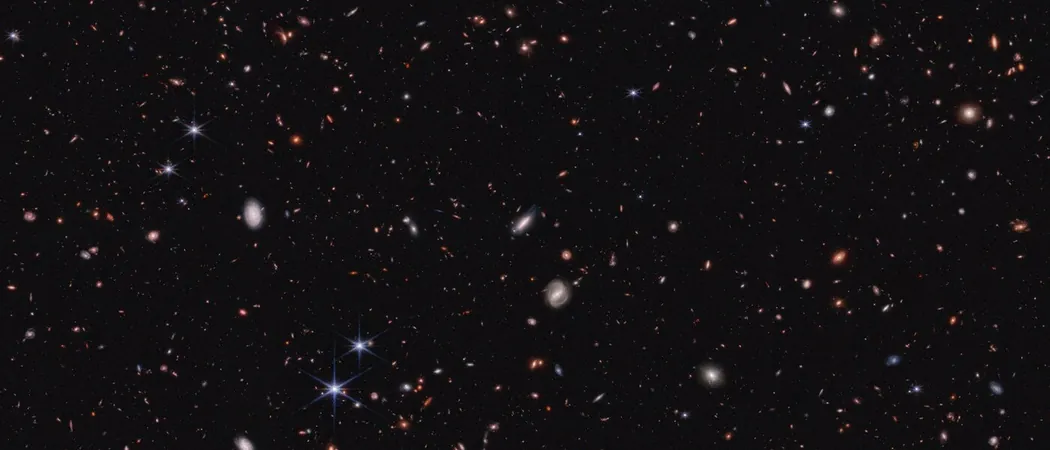
Shocking Discovery: New Research Dismantles Dark Matter Theory in Galaxy Formation!
2024-11-12
Author: Yan
Groundbreaking Study Challenges Dark Matter's Role in Galaxy Formation
A groundbreaking study has emerged that challenges the long-held belief in dark matter's role in galaxy formation during the early universe. Research conducted at Case Western Reserve University and published on November 12 in The Astrophysical Journal reveals that instead of dim signals from small, primitive galaxies, the James Webb Space Telescope (JWST) is observing large and bright ancient galaxies, which contradicts the standard dark matter hypothesis.
Lead Researcher's Surprising Findings
Lead researcher and astrophysicist Stacy McGaugh expressed his surprise, stating, 'What the theory of dark matter predicted is not what we see.' This deviation from expectations raises significant questions about our understanding of the universe's early days.
The Lambda-CDM Model
Historically, the widely accepted model, known as lambda-CDM, posits that galaxies formed gradually through the accumulation of matter, aided by the gravitational pull of dark matter. McGaugh, however, proposes that modified gravity may play a crucial role in this cosmic narrative. He refers to a theory he began advocating in 1998, known as MOND (Modified Newtonian Dynamics), which suggests that galaxy formation occurred much more rapidly than lambda-CDM would imply.
McGaugh's Predictions
'What MOND predicts is that the mass that becomes a galaxy assembles quickly and expands outward in tandem with the universe. Eventually, gravity takes over, slowing, then reversing that expansion, causing material to collapse into galaxies,' explained McGaugh, enhancing our understanding of how these colossal structures could form without dark matter.
JWST Observations
As JWST probes deeper into the universe's past—offering unprecedented glimpses into its early state—the observations consistently show large, luminous structures that align more closely with MOND's predictions than with traditional dark matter theories. 'The expectation was that every significant galaxy we observe today started from minute fragments, but the data indicates otherwise,' said McGaugh.
Implications for Astrophysics
This surprising turnaround not only prompts a reevaluation of dark matter's role but also opens up fresh avenues for research into alternative gravitational theories. Alongside McGaugh, the study includes contributions from Federico Lelli, currently affiliated with the INAF–Arcetri Astrophysical Observatory in Italy, former graduate student Jay Franck, and James Schombert from the University of Oregon.
Conclusion: A New Era of Research
'I guess the bottom line is ‘I told you so,’ McGaugh quipped, emphasizing the importance of making predictions and verifying them through observation. 'However, the quest to reconcile MOND with General Relativity remains a significant challenge,' he adds, highlighting that while the findings are promising, the scientific community continues to grapple with complex cosmic puzzles.
As scientists worldwide grapple with these findings, one thing is clear: the nature of our universe may be far more intricate than previously understood, and the possibility of rethinking the very foundations of modern astrophysics looms large. Stay tuned as this thrilling story unfolds—who knows what revelations the cosmos is still hiding?



 Brasil (PT)
Brasil (PT)
 Canada (EN)
Canada (EN)
 Chile (ES)
Chile (ES)
 España (ES)
España (ES)
 France (FR)
France (FR)
 Hong Kong (EN)
Hong Kong (EN)
 Italia (IT)
Italia (IT)
 日本 (JA)
日本 (JA)
 Magyarország (HU)
Magyarország (HU)
 Norge (NO)
Norge (NO)
 Polska (PL)
Polska (PL)
 Schweiz (DE)
Schweiz (DE)
 Singapore (EN)
Singapore (EN)
 Sverige (SV)
Sverige (SV)
 Suomi (FI)
Suomi (FI)
 Türkiye (TR)
Türkiye (TR)